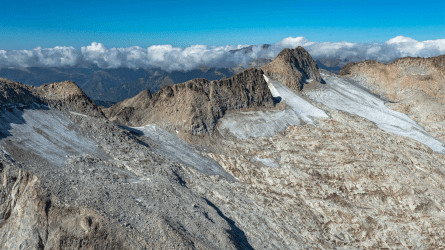
Glaciers in Rapid Decline
The glaciers of the Pyrenees are on the point of disappearing in the International Year of Glaciers' Preservation
~Open and free activity
~18:00h
~Miramar Palace, San Sebastián or online
Lecture by Eñaut Izagirre Estibaritz, PhD student at the UPV/EHU and contracted researcher at IPE-CSIC
©️Photo: Eñaut Izagirre
Description
Glaciers are outdoor libraries, natural archives of the planet's past and indicators of current climate change. Therefore, the sky is in the ice. Atmospheric composition, air bubbles, volcanic eruptions... Everything has been recorded – as testimonies of past events – and it is also happening today.
We can thus say that glaciers are reactive and active beings. They are not simple objects, but rather factors; fundamental elements of the earth's cycles, basic components of the climate system, and the planet's largest fresh water reserve. They are also part of the cultural and social life of high mountains and the poles, of wild and remote places; unfortunately, they are now a 'threatened species'. The loss of glaciers has terrible consequences for the planet's ecosystem, the water balance and for society.
During this session, we will analyse the importance of mountain glaciers, with particular emphasis on their role as sensitive indicators of climate change. Furthermore, the United Nations has declared 2025 to be the International Year of Glaciers' Preservation; therefore, the speaker intends to take the audience on a journey across countries: from the large frozen regions of Patagonia and Alaska, to the last small glaciers of the Pyrenees. The parallels drawn will be a clear invitation for us to reflect on: where do we come from? (glaciers are testimonies of the planet's natural memory) and to where are we going? (we will soon have a future and mountain range without ice).
Activity directed to
- All public
Program
20-03-2025
“Glaziarrak gainbehera azkarrean / Los glaciares en rápido declive“
- Eñaut Izagirre Estibaritz | Doktoregaia UPV/EHUn eta ikerlari kontratatua IPE-CSICen
Ana Galarraga zientzia-komunikatzaileak hizlariarekin elkarrizketa izango du hitzaldia amaitutakoan / La divulgadora científica Ana Galarraga mantendrá un diálogo con el ponente una vez finalizada la conferencia
Speakers

Eñaut Izagirre Estibaritz
UPV/EHU and IPE-CSIC
Eñaut Izagirre Estibaritz (Elgoibar, 1990) PhD student at the UPV/EHU and contracted researcher at IPE-CSIC Eñaut Izagirre was raised in the mountains of the Basque Country and the Pyrenees, and studied Geography at the University of the Basque Country (UPV/EHU). He completed a Master's Degree in Antarctic Science at Magallanes University (Punta Arenas, Chile) and received the mention of Glaciology. His research project was on the changes to reliefs (geomorphology) and glaciers; at the same time, he began to work with different international bodies. In 2015, he received a National Geographic grant to oversee the scientific research and exploration expedition in the Cloue icefield in the south of South America. Since 2018, apart from lecturing at the Geography Department at the UPV/EHU (2021-2023), Eñaut is studying for a PhD at the same university, as well as being a guest researcher at the Basque Centre for Climate Change (BC3). His PhD research is on the evolution of the Darwin Mountain Range on the island of Tierra del Fuego; since February 2024, he has been working at the Pyrenean Institute of Ecology (IPE-CSIC), on active projects of the CryoPyr research group in the Pyrenees.
Venue
Miramar Palace
Pº de Miraconcha nº 48. Donostia / San Sebastián
Gipuzkoa
Miramar Palace
Pº de Miraconcha nº 48. Donostia / San Sebastián
Gipuzkoa




